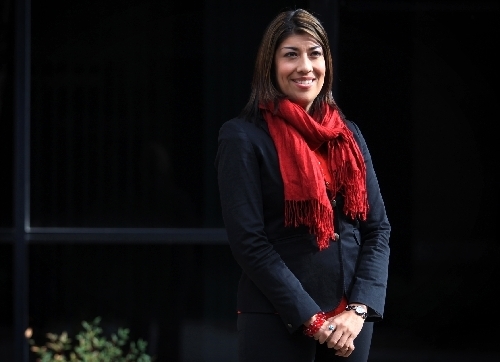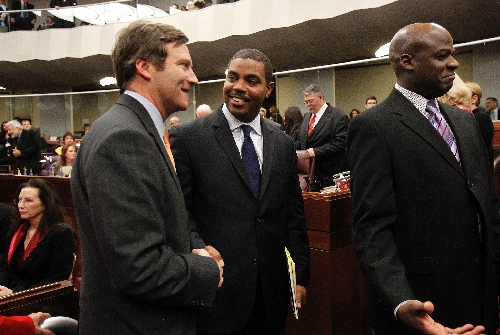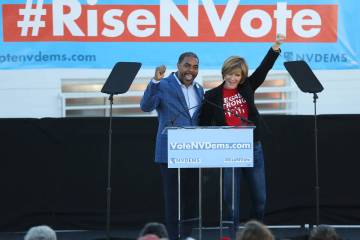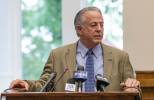Let political bargaining begin: Raising revenue or cutting costs will be argued
A few weeks ago, Lucy Flores joined her fellow freshman lawmakers for an exercise in negotiation.
Each was told to figure out a way to divide an orange with another new Nevada legislator. And they had to do it without divulging exactly why they needed the fruit -- the rind to make marmalade? the juice for breakfast? -- adding an element of uncertainty to the art of compromise.
"It was problem solving," said Flores, a North Las Vegas Democrat who praised the bipartisan training. "We learned that in order to come to a solution, most people have to give up something. It wasn't about debating who was right or wrong. I think everybody in the room figured out a way to eventually split the orange. ... I did get half of my orange."
But what if one orange was not, could never be, enough? Alas, the game didn't take into account what would happen if one side said it was time to shake the tree for more.
Yet that, in essence, is the real life dilemma facing lawmakers as the 76th regular session of the Nevada Legislature convenes Monday for a scheduled 120 days.
Democratic leaders argue the state must raise at least another $2 billion in revenue -- probably from higher taxes and fees -- to adequately pay for government, social services and especially education. And Republican leaders have united behind new GOP Gov. Brian Sandoval's pledge not to raise taxes, but instead live within Nevada's diminished, recession-starved means.
"I agree with the governor, that businesses are on the edge and raising taxes now will just cause more of them to fail," said state Senate Minority Leader Mike McGinness of Fallon. "I wish there were more money, but there isn't."
State Senate Majority Leader Steven Horsford has a ready response to those who support Sandoval's proposed $5.8 billion budget, which rolls back spending to 2007 levels. Horsford said Nevadans dealing with the nation's highest jobless rate at 14.5 percent, a housing crisis and a dismal education system need a boost from government now more than ever.
"It's not about money. It's not about politics. It's about people," said Horsford, of Las Vegas. "My district is made up primarily of working-class folks who are concerned about their families and their jobs. ... This is about fighting for the middle class."
Although both sides have pledged to work together, they are as far apart as the orange groves in California and Florida. That sets the stage for budget brinkmanship between the governor and the Democrat-led Legislature, which doesn't have the needed two-thirds vote in the state Senate or the Assembly to pass taxes and override a veto without GOP help.
"This legislative session has the makings of a major donnybrook if the governor holds firm," said Mark Peplowski, a political science professor at the College of Southern Nevada. "I anticipate there will be a special session, because this budget problem cannot be done, as the governor wants it, without the Legislature turning its back on labor, education and state employees."
Sandoval's budget
Sandoval's 2011-2013 budget does include $1 billion in new revenue. But Democratic leaders Horsford and Assembly Speaker John Oceguera of Las Vegas have questioned the wisdom and legality of much of it. For example, $425 million for school operations comes from school bond reserves that would normally go to retire debt. Another $190 million requires borrowing against future insurance premium tax collections, a tactic Horsford compares to taking out a second home loan.
Yet neither Horsford nor Oceguera has recommended any alternative sources of revenue. And they have tip-toed around the topic of raising taxes and fees, saying it's too soon to lay out any specific Democratic plan to raise more money.
"It's going to take us a little bit of time to go through the budget first," Oceguera said.
And it will take time to build a strong case to the taxpaying public. They also must gather support from several Republican lawmakers who would have to defy Sandoval and GOP leaders, something that doesn't appear likely at this point.
"If they have a different source of money that's not a new tax, we absolutely think that ideas to make the public's money work harder are good," said Sandoval's senior adviser, Dale Erquiaga. "This idea that suddenly, only tax revenue is a pure source is really an apology for saying we want to raise taxes. And we don't agree with that."
Behind the scenes, Horsford and Oceguera have been meeting for months with gaming and other business leaders and groups to test the political ground for tax increases that might be acceptable to Nevada companies.
The gaming industry isn't a target as casinos continue to struggle and their taxes already account for 27 percent of the state's revenue. But the mining industry is in the cross hairs, since gold prices are high and their taxes contribute a mere 1 percent of general fund revenue.
To avoid new levies or elimination of mining tax deductions, industry representatives might agree to pre-pay taxes beyond the $60 million that Sandoval's budget calls for already. But that might not be enough to satisfy the budget.
Two other new taxes have been the topic of much behind-the-scenes discussion:
■ A sales tax on services, which could raise $100 million to $200 million, depending on the rate and targets. Proponents argue it would broaden the base beyond a sales tax on goods, now 30 percent of state revenue. To lessen the blow, conservatives argue the sales tax on goods should be cut, which would give the poor and middle class a break.
■ A business franchise tax modeled after one in Texas, where it was approved by conservatives. Businesses chartered in Texas or that operate there pay the tax, which under a complicated formula takes into account a company's capital and assets. Small businesses with gross receipts of less than $150,000 are exempt. The Nevada Legislature rejected a proposed gross receipts tax in 2003; but a franchise tax might be more acceptable, since it doesn't tax a firm's top or bottom line.
Steve Hill, representing the Las Vegas Chamber of Commerce, met with Horsford and Oceguera and members of gaming and other industries to discuss both revenue and ideas for reform. Hill is also a member of Sandoval's transition team.
For now, Hill said, the chamber isn't taking a position on potential new taxes, although it remains opposed to a gross receipts and business income tax and disagrees with industry-specific levies. The chamber supports Sandoval's moves to trim government and change how it spends money despite concern about the impact on education and human services.
"There are virtually no good choices," Hill said, adding cutbacks must come with reforms. "We're still trying to understand the ramifications of these cuts. It's also a very bad time to raise taxes in this economy, with this level of unemployment."
Democratic strategy
Heading into the session, Sandoval has the advantage after being overwhelmingly elected with a mandate not to raise taxes. But Democrats are holding town halls to increase public pressure. And activists plan to keep it up, likely busing teachers to Carson City for rallies as they have done in the past.
The town halls highlight personal stories behind the cuts: the mother of an autistic child who might lose services, the student sitting in an overcrowded classroom, the professor threatening to leave Nevada. And with each budget hearing, opponents of specific cuts, large and small, are sounding notes of coming disaster.
"This is a death sentence for mental health courts," Washoe County District Judge Peter Breen warned at a hearing last week, criticizing Sandoval's plan to end state support for the special courts that help offenders get treatment to keep them out of jail.
Clark and Washoe counties could continue the mental health courts at a cost of $1.5 million a year.
Unions that have helped elect many Democrats would feel the brunt of Sandoval's cuts and reforms.
Sandoval proposed slashing salaries 5 percent for state employees, teachers and professors, a pay cut he also is taking. Like several other GOP governors, he called for ending tenure to make it easier to fire bad teachers.
"We have an opportunity to change the system," said Erquiaga, who added that he hoped that would be Sandoval's legacy. "So yes, if money has to come out of the education system, we ought to leave a different education system."
The governor's budget would cut state support for schools by 9 percent and for higher education by 7 percent. Overall, the budget cuts would be deeper -- up to 30 percent, university leaders contend -- if the loss of federal stimulus and other funds is included. The governor suggested universities and colleges raise tuition and fees for popular programs to fill the gap.
Lynn Warne, president of the Nevada State Education Association, rejected the idea that education reform without more spending can lead to better schools or that collective bargaining agreements protected poor teachers.
"We have a good system now to remove bad teachers from the classroom," Warne said. "The governor is moving the state in the wrong direction. It's demoralizing to teachers who have been told to make do with less."
Yet calls for change have been growing in light of Nevada's low graduation rates and achievement test scores. And Republicans seem ready to press for tougher measures to raise student performance.
A week before the session, freshman GOP state Sen. Ben Kieckhefer toured Smithridge Elementary School in his Reno district to learn about an innovative turnaround program. Under a $900,000 federal grant, the failing school had to get rid of its principal and half its teachers and staff, keep the best, hire fresh talent and then track student achievement over three years.
"This school illustrates to me the tremendous opportunity that exists to improve schools if districts are given flexibility over personnel," Kieckhefer said. "I think you're going to see incredible improvements at this school."
The aim is that the grant seed money will bear fruit for years to come, much like the seeds of the orange in the freshman lawmakers' exercise, which might have been used to plant a tree or even an orchard.
Contact Laura Myers at lmyers@reviewjournal.com or 702-387-2919.






























